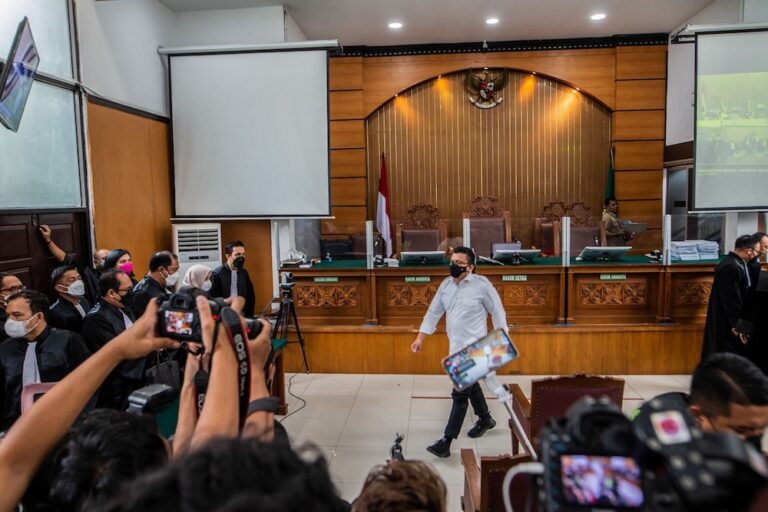(CPJ/IFEX) – CPJ is deeply troubled by the recent deportation of American journalist Amy Goodman, who was stopped at Bali’s Ngurah Rai international airport while en route to East Timor to cover the territory’s 30 August 1999 vote on independence. Goodman’s expulsion directly contradicts pledges made by President Habibie’s administration to lift restrictions on foreign […]
(CPJ/IFEX) – CPJ is deeply troubled by the recent deportation of American
journalist Amy Goodman, who was stopped at Bali’s Ngurah Rai international
airport while en route to East Timor to cover the territory’s 30 August 1999
vote on independence. Goodman’s expulsion directly contradicts pledges made
by President Habibie’s administration to lift restrictions on foreign
journalists, and to ensure that international observers, including media
representatives, are allowed free access to East Timor during the historic
referendum.
Goodman – a radio reporter and host of the Pacifica Radio news program
“Democracy Now!” – was barred from entering Indonesia on 23 August. Customs
officials showed Goodman her name both on a computer screen and in a book
containing the names of “hundreds if not thousands” of others on the
government’s “blacklist,” according to a statement released by WBAI in New
York, where “Democracy Now!” is produced. Goodman was told that she had been
blacklisted by the Ministry of Defense, and was put on board a Taipei-bound
plane.
Goodman has been reporting on East Timor for nearly a decade. In November
1991 she was beaten by Indonesian soldiers who objected to her covering the
army’s massacre of scores of East Timorese demonstrators in the Santa Cruz
cemetery. She was subsequently placed on the government’s blacklist, though
she was permitted to enter Indonesia in 1994 during United States President
Bill Clinton’s meeting with Indonesia’s then-President Suharto. During that
visit, on 12 November, Goodman and a colleague – journalist Alan Nairn, who
was on an assignment for the American magazine “Vanity Fair” – were detained
while trying to enter East Timor. Goodman and Nairn were held overnight in
West Timor before being flown back to Jakarta.
CPJ is dismayed that journalists continue to be barred from Indonesia on the
basis of their work. CPJ has praised President Habibie’s administration for
substantially improving conditions for press freedom in Indonesia since the
resignation of President Suharto last May, but Goodman’s expulsion proves
that the Indonesian government will still take crude measures to shut out a
critical voice.
During a May 1999 meeting with delegates from CPJ and the Brussels-based
International Press Institute, President Habibie promised to “never tolerate
that the Indonesian government will interfere with the freedom of the
press,” and he expressed the belief that freedom of the press is “very
important”. The president also pledged to ease restrictions on foreign
journalists, including lifting the requirement that they obtain special
journalists’ visas before entering the country.
Recommended Action
Send appeals to the president:
that Indonesian authorities abandon the policy of blacklisting journalists
blacklist so that she may return to report on political developments in East
Timor
Appeals To
His Excellency Bacharuddin Jusuf Habibie
President, Republic of Indonesia
Office of the President
Bina Graha, Jalan Veteran No. 17
Jakarta Pusat, Indonesia
Fax: +62 21 778 182
Please copy appeals to the source if possible.


